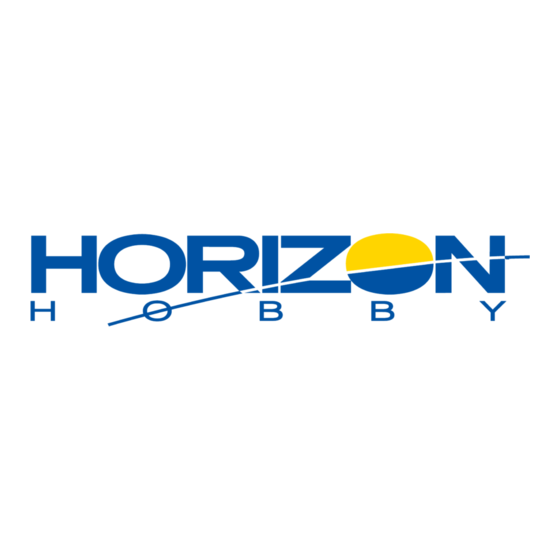

Horizon Hobby Hangar 9 Assembly Manual
Piper j-3 cub 40; plug-n-play
Hide thumbs
Also See for Hangar 9:
- Assembly manual (36 pages) ,
- Assembly manual (32 pages) ,
- Assembly manual (21 pages)
Table of Contents
Advertisement
Quick Links
Download this manual
See also:
Assembly Manual
Piper J-3 Cub
Specifications
Wingspan: ..................................... 80 in (2032mm)
Fuselage length: ......................... 49.9 in (1268mm)
Wing area: .......................... 919 sq in (59.3 sq dm)
Plug-N-Play™
ASSEMBLY MANUAL
�
��
Weight: .............................. 6.75–7.5 lb (3–3.4 kg)
Engine: .......................................Evolution™ .46 NT
Radio: ................................. 4-channel w/ 5 servos
40
Advertisement
Table of Contents

Subscribe to Our Youtube Channel
Summary of Contents for Horizon Hobby Hangar 9
- Page 1 � �� Piper J-3 Cub Plug-N-Play™ ASSEMBLY MANUAL Specifications Wingspan: ........80 in (2032mm) Weight: ......6.75–7.5 lb (3–3.4 kg) Fuselage length: ......49.9 in (1268mm) Engine: ........Evolution™ .46 NT Wing area: ......919 sq in (59.3 sq dm) Radio: ......... 4-channel w/ 5 servos...
-
Page 2: Table Of Contents
Table of Contents Additional Required Tools and Adhesives..........2 Covering Colors . -
Page 3: Warning
Warning An RC aircraft is not a toy! If misused, it can cause serious bodily harm and damage to property. Fly only in open areas, preferably at AMA (Academy of Model Aeronautics) approved flying sites, following all instructions included with your radio and engine. -
Page 4: Using The Manual
In that Horizon Hobby has no control over the final assembly or material used for the final assembly, no liability shall be assumed nor accepted for any damage of or caused by the final user-assembled product. By the act of using the product, the user accepts all resulting liability. -
Page 5: Section 1: Receiver Installation
Section 1: Receiver Installation Required Parts Step 2 • Fuselage • Receiver Place the remaining flat radio foam over the receiver and battery. Secure the foam to prevent the receiver and battery Required Tools and Adhesives from moving from their location. •... -
Page 6: Section 2: Landing Gear Installation
Section 2: Landing Gear Installation Required Parts Step 1 • Landing gear w/wheels Position the landing gear to the bottom of the fuselage. • Landing gear strap (4) Secure the position of the gear using four landing gear straps and eight 3mm x 10mm screws. •... -
Page 7: Section 4: Installing The Stabilizer
Section 4: Installing the Stabilizer Required Parts Step 2 • Stabilizer assembly • Fuselage Attach the elevator clevises to the elevator control horns. • #4 washer (4) • 4-40 x 1/2" socket head screw (4) Required Tools and Adhesives •... -
Page 8: Section 5: Wing Installation
Section 5: Wing Installation Required Parts Step 2 • Wing • Fuselage Thread the strut support anchors into the holes in the • 4-40 lock nut (16) • 4-40 nut (4) wing. The anchors have external threads. • Strut support anchor (4) •... - Page 9 Section 5: Wing Installation Step 4 Thread a 4-40 nut onto the threaded end of the strut. Thread a strut end onto the strut. The nut will be used once the strut has been adjusted. Step 5 Photo ...
-
Page 10: Adjusting The Engine
Section 5: Wing Installation Step 8 Step 9 Support the fuselage so the wing is not resting on the Repeat Steps 1 through 8 to install the remaining wing work surface. Adjust the strut end so it aligns with the panel and strut. -
Page 11: Control Throws
Control Throws The amount of control throw should be adjusted as closely Aileron as possible using mechanical means, rather than making Low Rate large changes electronically at the radio. By moving 3/8" (8º) Up 1/2" (9º) Down the position of the clevis at the control horn toward the High Rate outermost hole, you will decrease the amount of control 7/8"... -
Page 12: Preflight
Preflight Range Test Your Radio Step 3 Double-check that all controls (aileron, elevator, rudder Step 1 and throttle) move in the correct direction. Before going to the field, be sure that your batteries are fully charged, per the instructions included with ... -
Page 13: Notes
Notes:... -
Page 14: 2005 Official Ama National Model Aircraft Safety Code
2005 Official AMA National Model Aircraft Safety Code GENERAL 7) I will not operate models with pyrotechnics (any device that explodes, burns, or propels a projectile 1) I will not fly my model aircraft in sanctioned of any kind) including, but not limited to, rockets, events, air shows or model flying demonstrations until explosive bombs dropped from models, smoke it has been proven to be airworthy by having been... - Page 15 2005 Official AMA National Model Aircraft Safety Code 5) Flying sites separated by three miles or more Organized RC Racing Event are considered safe from site-to site interference, 10) An RC racing event, whether or not an AMA Rule even when both sites use the same frequencies. Any Book event, is one in which model aircraft compete circumstances under three miles separation require in flight over a prescribed course with the objective of...
- Page 16 � �� © 2005 Horizon Hobby, Inc. 4105 Fieldstone Road Champaign, Illinois 61822 (877) 504-0233 horizonhobby.com 7903...











Need help?
Do you have a question about the Hangar 9 and is the answer not in the manual?
Questions and answers